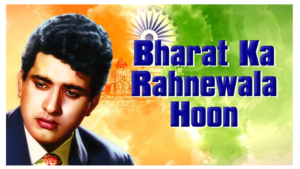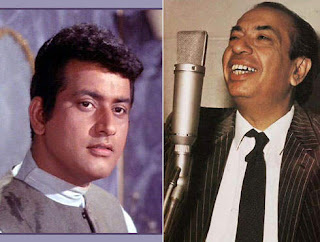Manoj Kumar—the man who turned cinema into a political commentary, who turned frames into flags—has left us at the age of 87. But true patriots don’t die; they echo through the voices they believed in. And for Manoj Kumar, those voices were Mahendra Kapoor and Mukesh. One thundered with the cry of the nation; the other whispered the ache of love.
Cinema, for Manoj Kumar, wasn’t entertainment—it was expression. It was resistance. It was resolve. And in an India that constantly seeks its soul, Kumar’s films offered answers. But more than the visuals, it was the voices that carried his legacy forward. Kapoor gave him Bharat. Mukesh gave him longing.
Let’s decode the man behind the moniker Bharat Kumar—through the music that made his revolution sing.
Mere Desh Ki Dharti – Upkar (1967)

This wasn’t just a song—it was a soil-soaked manifesto. Mahendra Kapoor didn’t sing here. He bled into the notes. In a country struggling post-Partition, Manoj Kumar’s portrayal of the son-of-the-soil farmer was a direct rebuttal to imported ideologies. The song, composed by Kalyanji-Anandji, turned into a war cry of agrarian pride.
O Mera Rang De Basanti Chola – Shaheed (1965)

Before tricolour filters on selfies, there was this. A song where Mukesh, Kapoor, and Mangeshkar collided in defiance. It wasn’t cinema—it was collective memory in motion. A reminder that resistance has always been youthful, poetic, and loud.
Bharat Ka Rahnewala Hoon – Purab Aur Paschim (1970)

Nostalgia isn’t always romantic. Sometimes, it is political. And this song, again by Kapoor, told the story of a confused NRI reclaiming his roots. At a time when India was chasing Western dreams, this film urged us to look back—not to regress, but to remember.
But patriotism alone does not build a legacy. Vulnerability does.
Ek Pyar Ka Naghma Hai – Shor (1972)

If Kapoor was his spine, Mukesh was his heartbeat. This song, tender and breaking, revealed Manoj Kumar’s personal politics—the pain of loss, the simplicity of love. It won Mukesh a National Award, but it also immortalized Kumar’s silence.
Tauba Yeh Matwali Chaal and Mehboob Mere – Patthar Ke Sanam (1967)

These Mukesh-led tracks showed Kumar in flirtation, in softness—a rare departure from the roaring speeches. It reminded us: even patriots fall in love.
Why It Still Matters
In a nation increasingly polarized, it’s tempting to remember Manoj Kumar only for his nationalism. But that would be a disservice. He wasn’t just waving the flag—he was also folding it respectfully at dusk. His cinema didn’t just preach—it healed.
And those songs? They weren’t background scores. They were philosophies set to music.
As we mourn the passing of a man who gave India its cinematic conscience, let’s also remember that voices like Kapoor and Mukesh were not merely playback singers. They were co-conspirators in Kumar’s quiet rebellion.
🎬 Long live the man who made patriotism poetic—and made love feel like a revolution.








